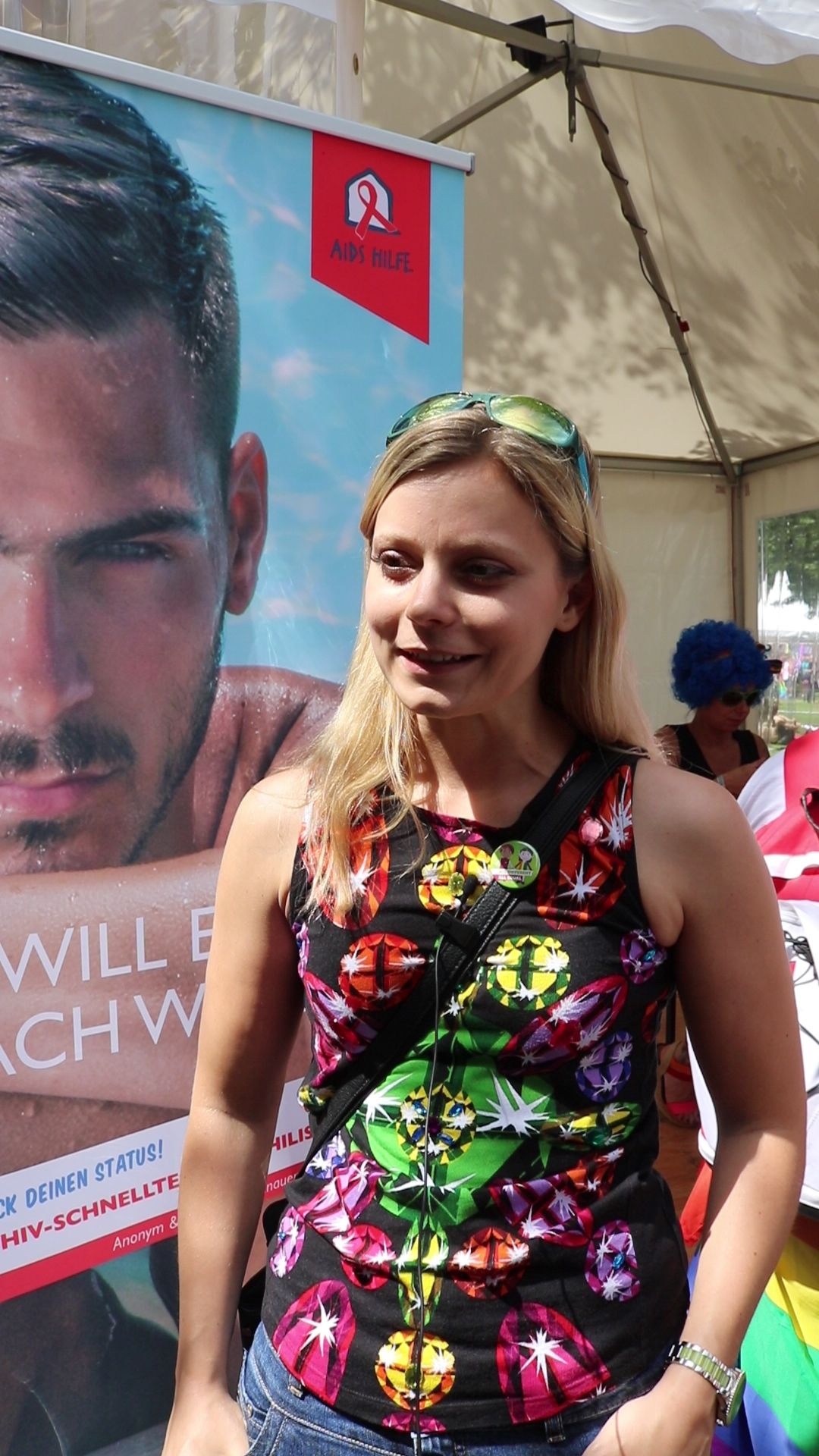In dieser Lektion
Lesen
Vor dem Lesen
Review family vocabulary again before reading another short interview text.
Lesen

Meine Familie ist eine große Familie. Ich hab’ sehr viele Cousins und Kusinen. Ich habe einen Bruder. Auch wir haben Homosexualität in der Familie, was ein Mitgrund war, mich hier zu engagieren. Ich habe einen Partner. Er heißt Leo, und wir leben gemeinsam hier in Wien.
Arbeit mit dem Lesen
Kultur
 Sabine sagt: “Auch wir haben Homosexualität in der Familie, was ein Mitgrund war, mich hier zu engagieren.” Aber wo engagiert sie sich? Sie arbeitet mit der Organization AIDS Hilfe Wien bei Vienna Pride. Mehr Informationen zur AIDS Hilfe finden Sie hier: http://www.aids.at/
Sabine sagt: “Auch wir haben Homosexualität in der Familie, was ein Mitgrund war, mich hier zu engagieren.” Aber wo engagiert sie sich? Sie arbeitet mit der Organization AIDS Hilfe Wien bei Vienna Pride. Mehr Informationen zur AIDS Hilfe finden Sie hier: http://www.aids.at/
Besuchen Sie die Webseite und lesen Sie, was für Service AIDS Hilfe anbietet.
Kultur
Some of the interviews in this unit were collected at Vienna Pride in 2016. With the stated goal of making “a visible statement for the acceptance of LGBT people,” Vienna Pride is a multi-day series of events attended by thousands of people. Like many Pride events elsewhere in the world, one of the centerpieces of the event is a parade, the Rainbow Parade. In 2018, Vienna Pride lasted for two weeks, and in 2019, Vienna hosted EuroPride. You’ll come back to more interviews from Vienna Pride in the last lesson of this unit, but for now, explore the websites of both Vienna Pride and Europride to get a sense of the what the event is like and what types of activities are included in the celebration.

Strukturen
As you noticed in the main portion of the lesson, today’s grammar topic is a review of many types of verbs in the present tense: haben and sein, regular verbs, modal verbs, and separable prefix verbs. You reviewed some tables of those verbs in the main lesson, and now you have a chance to practice a number of these (now familiar) concepts. Go back and review the forms, then complete the following activities.
Want more practice with separable prefix verbs? Check out this online resource from the University of Texas. They also have a great section on modal verbs that you can explore.
Schreiben
Schreibaktivität A
Sehen Sie sich das Link von Vienna Pride oder EuroPride (oben) nochmals an. Welche Aktivitäten gibt es? Welche Bilder sehen Sie?
- Beschreiben Sie eine Aktivität. Wo und wann ist es? Wieviel kostet es?
- Beschreiben Sie ein Bild. Was sehen Sie auf dem Bild? Was machen die Menschen in dem Bild?
Schreibaktivität B
Beschreiben Sie die Person(en), die Sie in der Klasse kennengelernt haben.

Schreibtipp
Try this trick for writing: write as much as you can in ten minutes to build your fluency. Then go back and underline or circle all your verb forms. Check back to the subject and make sure the verbs are correct. Look over the type of verbs you used: are there one or two verbs you used a lot? Could you try to vary your use of verbs a bit more? Which separable prefix verbs did you use, if any? Try to write a few additional sentences using separable prefix verbs, such as stattfinden, mitbringen, spazieren gehen, anfangen.
Wortschatz
Nomen
das Einzelkind, -er
die Eltern (plural)
das Geschwister, – (usually used in the plural: die Geschwister)
der Kern, -e
der/die Landtagsabgeordnete, -n
das Patchwork, -s
der Schatz, -¨e
die Wahl, -en
Verben
engagieren
leben
Adjektive und Adverbien
einzel
einzig
gemeinsam
halb
ledig
selber
stief- (does not exist as a separate word, but can be used to form composite nouns for members of blended families, who were not part of the same original family)
verheiratet